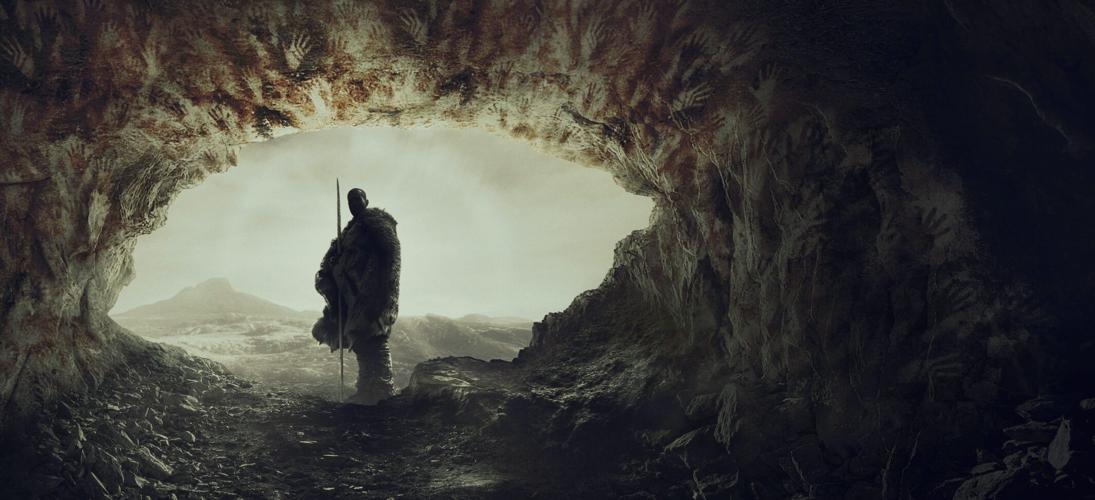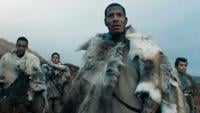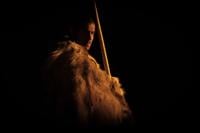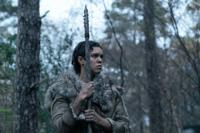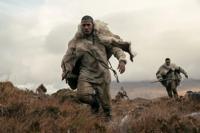The film opens with the date saying it's 45,000 years ago. This is around the time that the Neanderthals, aka cavemen, went extinct and were replaced with modern humans or homo sapiens. It's speculated that homo sapiens migrated into northern Europe where Neanderthals existed during this transitional period. It's not clear what caused the Neanderthals to go extinct, but this film, directed by Andrew Cumming in his feature debut, imagines a scenario of what might have occurred to cause the extinction of one species and the replacement with another.
At first, the film begins as a prehistoric, survival tale where a group of six people basically become stranded on the shores of a new country and have to figure out how to live. This film was shot in Scotland, but the country in question could be any northern European piece of land along the sea. The land seems barren or not capable of supporting vegetation or farming. There's not much resources for them to build a home or any kind of shelter. With the cold wind constantly blowing, this becomes an issue. There's also no animals for them to hunt for food. The screenplay by Ruth Greenberg doesn't explain why the group wouldn't attempt to fish or try to find food in the water, but the group's ultimate decision is to venture inland toward the mountains.

How the group manages to make it in these harsh conditions could have been a film unto itself. Several films have essentially done just that. Meek's Cutoff (2011) was about a group of settlers in antebellum days. The Revenant (2015) was about a group of fur traders in the early 19th century. Both Meek's Cutoff and The Revenant were about people trying to survive in harsh conditions or with little to no resources. Both are groups of people traveling to try to find better conditions. Those films though didn't take a decamillennial jump backwards in time to an area that probably was the harshest and had the least resources for humans. With successful, TV shows like CBS' Survivor (2000) or Discovery's Naked and Afraid (2013), such a narrative seemed likely to make it to the big screen. This film is basically that narrative.
Yet, a simple story of man-versus-nature didn't seem to be enough here. Cumming adds an element of the supernatural or at least Cumming wants that suggestion. The characters here face a physical danger, a deadly threat. Cumming takes his queue from Steven Spielberg's Jaws (1975) where the less you see of that threat the better. Spielberg gave glimpses to his film's threat, but it was never a mystery as to what it was. Spielberg had no trouble bringing the supernatural threat into the light in Jurassic Park (1993), but here, Cumming keeps that threat completely in the shadows and unseen.

This allows the characters to speculate and allow their imaginations to run wild. Some even believe that the threat is demonic or some kind of evil spirit. What could have been a threat similar to The Grey (2012) becomes one akin to the one in The Witch (2016). However, Cumming plays with light and shadows, embracing absolute black on screen. As the narrative plays out, that void functions in a lot of the same ways as the scares and thrills in Pitch Black (2000). The aesthetics aren't exactly the same as that science-fiction adventure, starring Vin Diesel. This film instead fits more in the bucket of the aesthetics of prestige horrors distributed by A24.
There's also a comparison to recent Oscar-nominee Society of the Snow (2023), a survival story that goes to the brutal lengths that humans took to keep alive. This film goes to parallel lengths but gets to those lengths quicker. Another Michael Giacchino connection that came to mind is ABC's Lost (2004). Giacchino was the music composer for both Lost and Society of the Snow, which are both about survivors of a plane crash. Both involve the mechanics, as well as the politics of how survivors make choices about how to stay alive or who their leader should be. Here, Cumming's film has the same dynamics, but again only done a lot quicker.

The creators of Lost in interviews said they initially wanted the leader of the survivors to be a tall, handsome man but through a series of incidents the true leader emerges to be an unlikely, small and scrappy woman. The Lost creators never got to do that switcheroo, but here, Cumming basically gets to do what the Lost creators proposed but never accomplished. Safia Oakley-Green plays Beyah, a young woman who might be a teenager, as we see her get her first menstruation. She's called a "stray," as she has joined a family that isn't her own, while fleeing their homeland for some reason. Beyah becomes that unlikely hero that takes the place of the tall, handsome man.
Chuku Modu (The Good Doctor and Game of Thrones) co-stars as Adem, the aforementioned tall, handsome man who is the patriarch of the family that Beyah joins. As the patriarch, he is of course the leader. He's not a bad guy, but he's depicted as a problematic leader, more so than the leader in Lost. Adem quickly becomes less sympathetic. Some could argue that Beyah also becomes less sympathetic, but that's more blunt a turn, which is meant to be blunt in order to underline a final point. That final point is one with which I do not agree, which made the landing of this film be as big a crash as the planes in Lost or Society of the Snow.

Spoiler alert! Spoiler alert! Spoiler alert!
The group of six, which includes Adem, his brother, Geirr, played by Kit Young (Shadow and Bone), and Adem's son, Heron, played by Luna Mwezi, are wondering if the threat they've experienced is some kind of monster. The final point tries to make the case that the threat isn't a monster or not the monster they thought. I disagree with this point. The threat, as depicted in this film, is a monster. Cumming's events make it clear that the threat is absolutely a danger. From kidnapping a child to murder, Cumming attempts to gaslight us that those things aren't monstrous. It's rather absurd. It could be akin to Lost again and the reevaluation the show does to "The Others," who were that show's chief threat that were at first unseen and unknown. It's fine to humanize people who are unknown in order to find some understanding or common ground, but Cumming's final point is to make that case, while also dehumanizing the protagonists, which I didn't appreciate.
Rated R for violence and grisly images.
Running Time: 1 hr. and 27 mins.
In theaters.


